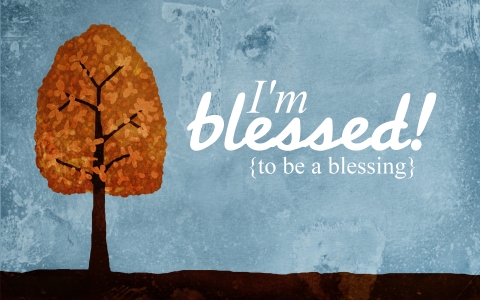
In the beginning Genesis 1 and 2 describe how the Creator blessed a few people with a beautiful land full of food and animals to enjoy. But those first few people did not enjoy the blessings God gave them in the way God commanded. They wanted to take every blessing from God for themselves.
The first humans disobeyed God's order to refrain from one specific tree and lost many blessings as their punishment. But God was gracious. He blessed people with many children and soon the earth was full.
People did not handle their newfound abundance well. Genesis 6 says people did not love each other. They did not work hard to provide for their families or care for each person's needs. Their hearts turned inward. They attacked and stole and killed each other to get more of God's blessings for themselves. So God punished them with a great flood. Humanity had failed to respond properly to the blessing of a burgeoning population.
In Genesis 10-11 human beings began to form large nations with strong cities and a common language for everyone to speak. The people could have thanked God for their success and shared their blessings with one another. But the leaders decided to build great monuments and towers to show that they were more powerful than the gods. They wanted to create a wonderful world without any great God, only Great people. So they were punished and their power and towers destroyed.
That is when the Bible introduces us to a man named Abram. In the land where Abram was born, most people thought gods lived above the sky. They thought the most powerful god was the moon at night and the sun during the day. Nobody knew who the real God was because their ancestors had rejected him and misused God's blessings. But God would not give up. He wanted us to know who he really is and the way we were created to live. So he spoke to Abram with a command and a promise.
Now the Lord said to Abram, “Go from your country and your family and your father’s house to the land that I will show you. And I will make a great nation out of you. I will bless you and make your name great so that you will be a blessing. I will bless those who bless you, and him who dishonors you I will curse, and in you all the families of the earth shall be blessed.” - Genesis 12:1-3
In Genesis 12:2 God promises Abram, "I will bless you and make your name great." Then God gives the reason: "so that you will be a blessing." God does not say: "so that your life will be wonderful." God does not say: "so that you will get what you want." He says: "so that you will be a blessing" to others. God repeats that same point in Genesis 12:3. "In you (Abram) all the families on the earth will be blessed." Here is the lesson we must learn: The purpose of blessing Abram is not for Abram to be blessed. Huh? The purpose of blessing Abram is to bring a blessing to everyone else through him.
This is God's method for redeeming the world. He gives to one of us so that we will give to others. He shows himself to one of us so that we might show him to others. He teaches us a lesson so that we might teach others. God works through us. If God wants to bring love and forgiveness to the whole world, he shares it with a few people so that they can share that love and forgiveness with others.
God's plan to bless people so that they will bless others runs through the entire Bible. It is in the New Testament as well as the Old Testament. Paul commands in Ephesians 4:32, "Forgive one another as God in Christ forgave you." Do you see the pattern? We are forgiven so that we forgive. John relies on the same logic in 1 John 4:19. "We love because he first loved us." What God gives to us, we pass along to others. What we experience in our relationship with God isn't supposed to end with us. God reaches out to us so that he might work through us.
This is what we call the pipeline principle. God does not want you to use all your blessings for yourself. He wants you to distribute what you are given. He wants you to be a pipeline that pours out his blessings onto other people not a bucket holding blessings for yourself. So ask yourself this simple question: Are you a bucket or a pipeline? Buckets store the water poured into them. Pipes let the water run through them. Pipes deliver the water to new people and places.
In the land of Israel, the Bible talks about a giant lake called the Dead Sea. The Jordan river pours water into it constantly. However, the Dead Sea does not pour out the water into any other streams. The Dead Sea just traps the water like a big bucket.
Do you know what that has done to the Dead Sea? Every living thing that enters the Dead Sea dies. There are no fish that can survive. God does not want us to be the Dead Sea. He does not want us to collect fresh water like a bucket and keep it for ourselves. God wants us to share every good blessing we have received like a pipeline sending fresh water to people and places that need it.
I do the same thing in my life. I use God's method of sharing blessings when I give candy to my kids. I have 5 children. Sometimes I buy a small bag of candy and want to give one piece to each child. So I give 5 pieces to my oldest son and ask him to give one piece to each of the other children. Most of the time it is a good plan, but sometimes not all the children get a piece of candy. How can that happen? I believe my math is good in that calculation. So if I give 5 pieces of candy to my oldest son, how does every child not get one piece? What goes wrong?
If you are a parent, you know what happens. One child has taken more than one piece for themselves. Someone does not pass on the candy they received from their father. We make the same mistake with God's blessings. We use them for ourselves rather than blessing other people with what God has given to us. I believe God would say to us what I say to my children when they do not pass along the candy meant for their siblings: "Stop taking everything I give you for yourself. I only gave it to you so that you could share it with your brothers and sisters!"
Now let's return to the story of Abraham. God did bless Abram as He promised in Genesis. He changed his name from Abram to Abraham to declare he would be a "father of many." Abraham's descendants did become a great nation. The Bible calls that nation Israel.
Exodus 19:6 describes Abraham's nation as "a kingdom of priests." In the ancient world where Israel lived, "priests" helped people meet God. Priests brought people into God's presence. Under the leadership of prophets like Moses and kings like David, Abraham's great nation of Israel introduced other nations to the one true God. Abraham's descendants were priests to the ancient world. God blessed the nation of Israel so that they could bless the rest of the world with knowledge of the one true God and how he wanted people to live. When they stopped representing God well, their might crumbled.
Our blessings are different than Abraham's blessing. Creating a great nation out of Abraham's family was a special plan God had for that period in human history. Our children will likely not become a mighty nation whose laws and customs display God's character and identity to the world. God has many other ways to bless us so that we might be a blessing to our world.
What blessings has God given you? The blessings you have been given are not what you might expect. You may have been given pain so that you can bring comfort to those who suffer. You may be given poverty so that wealth does not distract you from concern for your neighbor. You may be given a brilliant mind so that you can solve some of the toughest problems in your community. You may have been given loving parents so that you can adopt children into your family and rescue them from neglect and abuse. You may have been given good hands for building and repairing so that you can help a widow when things are broken in her house. You may have been given a gift of leadership so that you can start a business that hires people in your neighborhood who need jobs. You may have experienced God's power so that you can help people break free from the sin that is destroying them and their families.
Take one minute and think about what blessings you have been given so that you can bless others. What skills or experiences or resources do you have that could help other people experience the love and wisdom and justice of God? Pray and ask God to show you right now before reading further.

Jesus believed in the pipeline principle. In Matthew 18, he told a story of a tax officer who was forgiven a great debt he owed a king. After that tax officer had been forgiven, he found another man who owed him a little money and demanded it back. When the second man could not repay the small sum of money to the tax officer, he attacked him and choked him and sent him to jail. The king in Jesus' story hated this hypocrisy. In Matthew 18:33 the king scolds the unforgiving tax officer and says, 'Should you not also have had mercy on your fellow man, in the same way that I had mercy on you?'
Do you understand the lesson Jesus taught in this story? Jesus was teaching us: you cannot take God's forgiveness for yourself but refuse to pass it on to others. If God gives you a blessing, then you are expected to share that blessing with others. This is how God works. God does not keep pouring blessings into buckets. His plan is to pour love and mercy into people who act like pipes that pour it out on others who need it.
I have travelled to every inhabited continent in the world. One of the greatest deceptions that people believe and teach around the world is that God wants to fill up your bucket with blessings just for you. I call this message the gospel of personal prosperity.
Now is it true that God loves to bless his people? Yes. But people have misunderstood the purpose behind God's blessings. It is preached that God wants to make you rich. Millions of people around the world wrongly believe that God wants to end the problems in your life. They have been told God wants to bless you so you can move from poverty to wealth or from pain to happiness. But the purpose of God's blessings aren't just to make your life better. That idea is wrong. Why is it wrong? The gospel of personal prosperity is wrong because it believes you are a bucket collecting blessings for yourself rather than a pipeline passing along what God gives you.
Jesus taught in Luke 12:48, "To whom much is given, much is required." If you have been richly blessed, then you have a great responsibility to use it to bless others. So be careful when you pray for God to bless you. Greater blessings entail greater responsibility.
The book of James in the Bible warns us about selfish prayers for personal gain. Prayers that ask God to fill our buckets with extra blessings are powerless because they misunderstand why God blesses people. James 4:2-3 says, "You do not have because you do not ask. You ask and do not receive because you ask with the wrong purpose. You just want stuff for yourself." We should ask God for gifts so that we have more to give to others not more for ourselves. That is God's heart.
God cares about the whole world not just you. You are part of something much BIGGER than yourself. God wants to use you as a pipeline that pours out his blessing on other people.
God's paradigm for blessing the world with his love, forgiveness, and wisdom has been the same since the time of Abraham. God blessed Israel so that they could bless the world with the knowledge of the one true God. God has given us many blessings so that we can do the same. What he pours into us, we must pour out.

Earlier I asked you to think about the ways God has blessed you. I want you to think about it again. Has God calmed your fears? Now you can calm the fears of other people. Has God showed you how to create a loving family? Then teach your friends how to be a kind and responsible leader in their family. Has God given you strength and hope to endure suffering? Then comfort your friends who are suffering and help them find strength in Jesus to persevere. Has God given you a position in the government? Then make sure your community upholds justice so people are treated fairly. We have been given many blessings that we forget we have. But remember what Jesus said, "To whom much is given, much is required."
If you cannot think of blessings God has given you to share, then ask God for new blessings so you can pass them along to people you meet. This is God's plan for blessing the world with an understanding of who he is and how he wants us to live. We must be continually filled by God so that it can flow out to other people.
Now may God's promise to Abraham become your experience. Be blessed so that you can be a blessing to others.








 RSS Feed
RSS Feed
